So we’re nearing the end of another academic year, and many Russian students are nearing the end of their высшее образование (higher education) and will soon graduate from a university, which is often referred to simply as вуз (высшее учебное заведение – institution of higher education).
Take this comment about someone unlikely to have made it into university: Но ему, к сожалению, никакой вуз не светит. (He’s got no chance of getting into college, unfortunately.)
The lucky Russian students, however, will soon be receiving their degrees and moving out into the wider world, which may have no idea what to call them.
In the United States and many universities in Europe we have bachelor’s degrees, master’s degrees, and PhDs. Universities in Russia are moving towards this system to make their degrees compatible with European standards. So they now offer courses of study where graduates will receive бакалавр (bachelor’s) and магистр (master’s) degrees.
So far, so good. But many Russian universities still operate under the previous system, in which periods of study and degree titles are very different. First of all we have the title of специалист, which is a five-year course. Like our B.A. courses, it is the first step in higher education, but, as Russians are quick to point out, can be more intensive. In fact, it is often considered equivalent to our bachelor’s and master’s programs combined. For example, one Moscow university is now making the switch from specialist to bachelor’s programs, and this will mean a 33 percent reduction in classes.
The next level, under the current system, is generally referred to as аспирантура (graduate school), and graduate students are referred to as аспиранты (after the switch, the system will be known as магистратура.) После окончания университета я пытался поступить в аспирантуру, экзамены сдавал три года подряд. (After graduating from college, I tried to get into graduate school; I took [but didn’t pass] the entrance exams three years in a row.) When someone finishes graduate school and defends a dissertation, he or she receives the degree кандидат наук.
This is where the confusion really sets in. Since this degree immediately follows the undergraduate five-year education, many are tempted to equate it to a master’s degree. However, the length of time and work required often put this degree on the same level as a PhD in the United States. To attain this degree, students have to write and defend a dissertation, which should be original research averaging 150 pages, and the average time frame is three to five years, roughly corresponding to the average time frame for our PhDs.
So, how to translate this degree? One option would be the direct calque, Candidate of Sciences, which would have the advantage of making it clear in what country this degree was obtained. This could be misleading to the general public though, who might take it for a degree in natural science. As I may have mentioned before, наука has a much broader meaning in Russian than in English, and can refer to all academic disciplines. The equivalent of the narrower English meaning would be естественные науки (natural sciences).
You could simply use PhD, which would be readily understood – but might cause confusion as to where the degree was obtained, and could not be used for official purposes. A third hypothetical option would be to create an actual translation, referring to the field of study in the title, i.e., Candidate of Physics, Philology, etc., but this system is not in use.
What we definitely cannot call a person with this degree is a PhD candidate, since that refers to a person who has not completed his or her studies.
The next step up the Russian academic ladder is the post-doctoral degree of доктор наук (Doctor of Sciences), which is seriously prestigious and difficult to get. The United States does not have an equivalent degree, although Germany and France apparently have similar titles.
That covers the actual degrees, but then there is the difficulty of what to call people who go on to teach at universities after receiving them. Americans are pretty relaxed about referring to everyone at a university as “professor”, at least in conversation, but in Russia, профессор is a specific title (ученое звание) and position, determined by the teacher’s school. It’s usually necessary to be a Doctor of Science to reach this rank. Your average university instructor is a доцент, equivalent to the rank of associate or adjunct professor. Okay, apparently the word docent is used at some American universities to describe a lower-ranked teacher or lecturer, but I think most native speakers would associate the word first with a museum guide.
The Russian Tongue: Down ‘n’ dirty in the springtime
The Russian Tongue: How to lose friends and annoy people
The Russian Tongue: When sorry is the hardest word
The Russian Tongue: Minding your Russian Ps and Qs
The Russian Tongue: Bombing your way around Moscow
The Russian Tongue: Making merry with Father Frost
The Russian Tongue: The big freeze
The Russian Tongue: Talking Tolstoy
The Russian Tongue: Let me hear your body talk
The Russian Tongue: There is nothing like a dame
The Russian Tongue: Babes and babushkas
*
Learning Russian but finding the lessons too formal? In her entertaining column The Russian Tongue, Sara Buzadzhi gives practical informal tips on everything from dealing with traffic cops to flirting in the grocery store. Sara’s columns are published with permission of www.themoscownews.com, where they appear every two weeks.
Sara Buzadzhi is an English teacher and translator in Moscow.



